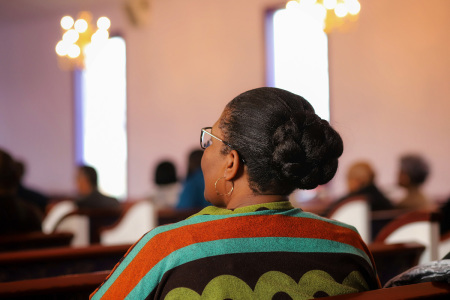Most black adults believe religion, church play significant role in African American experience

The majority of black adults in the U.S. believe that to understand the African American experience, it's necessary to understand the role of religious faith in black people's lives, a new study has found.
A Barna survey of 1,083 U.S. black adults, plus 822 black churchgoers, found that four out of five black U.S. adults who align with some type of faith group agree to some extent (41% “strongly,” 38% “somewhat”) that “To understand the African American experience, it is necessary to understand the role of religious faith in the lives of black people.”
Most members of the black church also believe faith is crucial to the black experience, with half (50%) agreeing “strongly” and 38% agreeing “somewhat.” Faith is also considered a source of emotional strength, with nearly all black churchgoers today “strongly” agreeing with this sentiment.
Interestingly, the proportion of black adults who say church involvement is overall “desirable” is on the decline, from 90% in 1996 (71% “very” plus 19% “somewhat”) to just 74% today (44% “very” plus 30% “somewhat”). Among black adults who attend church, 58% desire to be active in their place of worship.
Age also impacts church engagement, with 66% of Boomers who are part of the black church saying it’s “very desirable” compared to just 55% Gen X, 51% millennials, and 46% Gen Z.
The majority of religious black adults in 2020 (69%) agree (one-third “strongly” so) that “the pastors of African American churches are the “most important leaders within the black community.”
The report, which is one of several looking at the state of the black church in America, was developed in partnership with Black Millennial Cafe, Urban Ministries, Inc., American Bible Society, Compassion International, Gloo, and Lead.NYC. It describes how black Americans, including members of predominantly black churches, perceive the role of the Church and their political views.
Previously, Barna reported that most members of the black church believe the church provides comfort and agency, countering a broader sense of political powerlessness.
In 1996, 50% of black Americans agreed with that statement, while 41% disagreed. In 2020, however, the percentage of black Americans who agreed with the statement shot up to 65% and among black churchgoers, it was a staggering 80%.
Brooke Hempell, senior vice president of research at Barna, said: “The story of the Black Church in America is important for our nation and for Christianity. We have conducted hundreds of studies about faith and culture, and we have found consistently that black Americans have a more active faith — in prayer, reading Scripture, and worship — than other racial groups in this country. We are excited to share the story of this legacy with fresh data.”
A recent study from Pew found that while 61% of black Americans say their historically black congregations need to be more diverse and the race of attendees wasn’t a priority, most black Americans are drawn to black churches for reasons beyond race, including sermons and worship style.
“Sermons are a prime example: Black Americans who attend black Protestant churches are more likely to say they hear messages from the pulpit about certain topics — such as race relations and criminal justice reform — than are black Protestant churchgoers who attend multiracial, white or other race churches,” researchers said.
“Protestants who worship in predominantly black churches are more likely than other black Americans to say their congregations feature worshippers calling out ‘amen’ or other expressions of approval (known as call and response). They are also more likely to feature expressive forms of worship, including spontaneous dancing, jumping or shouting. And 54% of Protestants in black congregations say the services they attend feature speaking or praying in tongues, a practice associated with Pentecostalism,” Pew’s report on the survey explained.





















